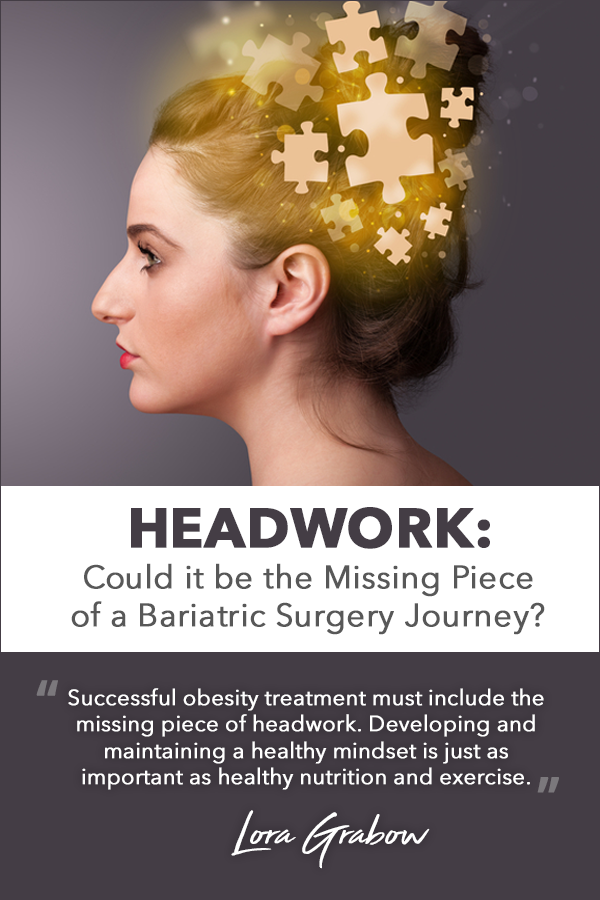
Headwork: Could it be the Missing Piece of a Bariatric Surgery Journey?
July 22, 2019Headwork - The Missing Piece: As a bariatric behaviorist for the last 15 years, I have listened to my bariatric surgery patients say “I am learning I had surgery on my stomach but not my head.” As a bariatric surgery patient, I am sure you can relate to this statement as well.
Obesity is a life-long chronic disease. It is a complex disease that needs complex treatment.
Bariatric surgery is a scientifically sound and effective treatment for the disease of obesity. However, it is not a cure. Bariatric surgery patients are more likely to have lifelong success if they also incorporate healthy behavior change, a piece I call headwork.
Headwork: Tools to Create and Maintain the Right Mindset
Imagine you were getting ready to play a game of baseball. What equipment would you need to be successful? I imagine you would bring a ball, a bat, glove, and wear a baseball cap. But what if you showed up with only the bat, glove and baseball cap? What if you were never given the ball? You would not be successful.
I have learned that many bariatric surgery patients are missing the “ball” on their treatment plan. Patients are, of course, given the bat. This is the surgery itself. Patients are given the glove (nutrition knowledge) and a baseball cap (exercise knowledge). Their treatment plan is missing one integral component...the tools to create and maintain the right mindset.
One must move beyond answering the question HOW do I lose weight to WHY do I eat?
Think about that question for a moment; WHY do you eat? We know the “correct” answer is to satisfy physical hunger. How many times though have you turned to food for non-hunger reasons? From my experience with bariatric surgery patients, these are just a few of the reasons patients eat:
- Bought your favorite treat to celebrate a good day.
- Rewarded yourself with a late-night snack for surviving a hard day.
- Eating food to manage boredom.
- “Cleaning your plate” to not waste food.
- Celebrating with food to just keep that good feeling going.
Bariatric surgery does not rid you of these lifelong behaviors. The above examples have nothing to do with physical hunger and everything to do with sabotaging thoughts triggering for non-hunger reasons.
The research suggests that 75% of our eating is triggered by non-hunger cues. Many people believe eating is “ just automatic.” It is not. Our heart beating is automatic. Blinking is automatic. Breathing is automatic. Eating is not an automatic behavior. If we can slow down before we take that first bite, we will realize that we all have a thought before we eat.
In fact, every behavior is driven by that thought and emotion. If we can change our thoughts, we can change our behavior. What we THINK determines how we FEEL which determines what we DO.
Can you identify with the following thoughts?
- “Just one won’t hurt”
- “I’ll start over tomorrow”
- “I deserve a treat”
- “It's not fair that others can eat that and I can’t”
- “I just can't do this anymore”
- “If no one sees me eat it, it doesn’t count”
- “I can’t waste food”
- “I can’t say no. She made it just for me”
- “I’m stressed. I have to eat”
- “I’ve already blown it so I might as well blow it big”
The above thoughts are examples of what I call “ Stinkin’ Thinkin.” Stinking’ thinkin’ is powerful. Stinkin’ Thinkin can zap our motivation. Stinkin’ Thinkin can trigger emotional eating. Stinkin’ Thinkin can undermine our confidence. Stinkin’ Thinkin can trigger a regain of weight loss after surgery.
Stinkin’ Thinkin could be a very powerful factor undermining your bariatric surgery success. Does your current bariatric treatment plan include tools to identify and decrease the power of your Stinkin’ Thinkin? If not, losing weight and keeping it off will feel like showing up to play baseball without a ball. I am writing this series to provide you with hope. It is time you were given “the ball” to maximize your success in filling the missing piece of headwork.
The Importance of Developing and Maintaining a Healthy Mindset
Successful obesity treatment must include the missing piece of headwork. Developing and maintaining a healthy mindset is just as important as healthy nutrition and exercise. All three are needed for success.
If you want to learn more about decreasing the power of your Stinkin’ Thinkin, keep reading this series. This series will include two more articles. In my upcoming articles, I will introduce you to the Cognitive Behavioral Therapy model. Cognitive Behavioral Therapy can provide you with practical headwork tools and strategies to combat your Stinkin’ Thinkin. Cognitive Behavioral Therapy has helped many of the bariatric surgery patients in my practice to enhance and maintain their weight loss. Cognitive Behavioral Therapy tools can be your “ball” too. I can’t wait to share them with you!
Check out Part 2 of my Headwork article series!
 | ABOUT THE AUTHOR Lora Grabow, LMSW is a professional counselor and coach who has spent two decades working specifically with weight loss clients in one-on-one therapy and group workshops. Today, she also coaches clients in her online community and in her online course, Foundations in Headwork for Healthy Weight Loss. She helps all her clients tackle the barriers that have kept them from making change permanent and keeping the weight off for good. Read more articles by Lora! |




